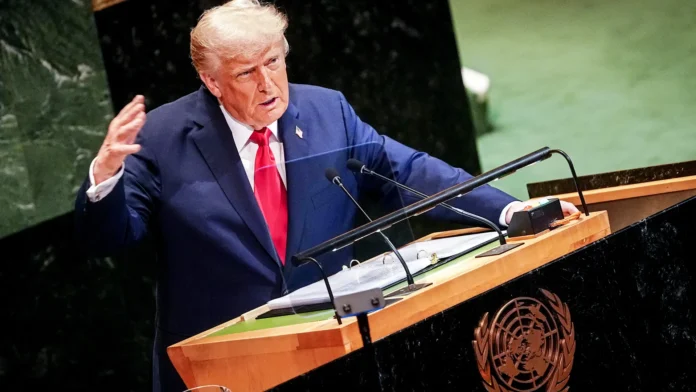When President Donald Trump stepped up to the podium at the United Nations General Assembly in New York City this week, world leaders expected his usual fiery rhetoric. What they did not expect was to hear him throw aside the teleprompter, crack a joke, and deliver a lighthearted “two-word threat” that left the chamber echoing with laughter.
For nearly an hour, Trump addressed some of the most serious issues facing the globe, from ongoing conflicts to international instability. Yet, the moment that stole headlines came just minutes into his remarks, when the unexpected happened: the teleprompter failed.
A Technical Glitch Interrupts Trump’s UN Speech
The annual UN General Assembly is the world’s largest diplomatic stage. Leaders from every corner of the globe gather in New York each September, with each speaker expected to deliver carefully crafted remarks to the international community.
Trump, however, has never been one to stick strictly to the script—and when his teleprompter froze mid-sentence, he took it in stride.
“I don’t mind making this speech without a teleprompter, because the teleprompter is not working,” Trump told the audience, his voice cutting through the vast chamber.
For a split second, silence hung in the air. Then, chuckles began to spread among the rows of dignitaries, ambassadors, and reporters.
The ‘2-Word Threat’
Instead of showing frustration, Trump turned the mishap into a moment of levity. Looking out across the hall, he grinned and made his now-viral quip:
“I can only say that whoever is operating this teleprompter is in big trouble.”
The two-word “threat”—“big trouble”—was classic Trump: blunt, humorous, and delivered with the same timing he’s often used on the campaign trail.
Laughter rippled across the room, cutting through the otherwise tense atmosphere of a summit dominated by talk of war, peace, and global crises.
Moments later, Trump was handed a printed copy of his speech, and he continued without missing a beat.
Why the Moment Struck a Chord
For world leaders used to dry, heavily scripted addresses, the exchange was refreshingly human. In an era of careful wording and cautious diplomacy, Trump’s ability to shrug off a technical glitch and turn it into a laugh highlighted both his improvisational instincts and his flair for showmanship.
The moment reminded many older Americans watching at home of an earlier era in politics—when leaders spoke off the cuff, unafraid to risk a little humor even on the world stage.
Trump’s Busy Week Leading Up to the UN
The United Nations appearance was only the latest event in a whirlwind stretch for Trump. Just days earlier, he had traveled to the United Kingdom with First Lady Melania for his second state visit, drawing crowds and headlines abroad.
On Sunday, he attended the memorial service for conservative activist Charlie Kirk, where his tribute to the young leader drew both praise and controversy.
Then, on Monday, Trump once again made headlines alongside Health and Human Services Secretary Robert F. Kennedy Jr. as they unveiled a new initiative on autism—an announcement that sparked heated debate among medical experts.
By the time Tuesday rolled around, all eyes were fixed on Trump’s UN speech, with many expecting fireworks. Instead, it was the teleprompter joke—his offhand “big trouble” comment—that stole the spotlight.
The Weight of the UN General Assembly
To understand why the moment resonated, one must appreciate the formality of the UN General Assembly.
Each September, heads of state gather to deliver carefully measured remarks. Issues such as war in Eastern Europe, the conflict in the Middle East, and the challenges of migration dominate the agenda. Every word is scrutinized, every gesture analyzed.
For Trump to take a technical hiccup and turn it into a joke in front of such a serious audience was not only unexpected—it was disarming. It reminded many that even in the halls of the most powerful global institutions, humor still has a place.
Laughter Amid Serious Issues
While the joke provided levity, the speech itself was no laughing matter. Trump went on to speak forcefully about border security, national sovereignty, and energy independence. He warned against what he called the dangers of “open borders” and criticized global institutions for failing to protect citizens from instability and crime.
But for many in attendance, the memory of Trump’s playful “big trouble” remark lingered even as the speech grew heavier. It was a moment that cut through the tension and showed the world a leader who, for better or worse, is unafraid to go off-script.
Reactions Across the Globe
International media quickly seized on the incident. Outlets from London to Sydney ran headlines highlighting Trump’s “teleprompter joke” more than the content of his policy remarks.
On social media, clips of the moment went viral. Some praised Trump for his humor and ability to handle adversity with ease. Others criticized him for not taking the occasion seriously enough.
Yet for millions of Americans—especially seniors who appreciate plain talk over polished soundbites—the moment was endearing. It felt genuine, unrehearsed, and unmistakably Trump.
Humor as a Political Tool
Throughout his career, Trump has used humor as both a shield and a sword. On the campaign trail, he frequently lightened crowds with nicknames, jokes, and improvisational quips. At rallies, these moments often drew louder applause than any policy statement.
At the United Nations, the strategy worked again. By joking about the teleprompter operator being in “big trouble,” Trump shifted the audience’s attention from a technical failure to a shared laugh—turning what could have been an embarrassing distraction into a memorable highlight.
The Larger Message
While the teleprompter joke grabbed headlines, it also served a deeper purpose. Trump’s point was clear: he doesn’t need a teleprompter to get his message across.
For many of his supporters, this was symbolic of his broader approach. He presents himself not as a polished career politician, but as a straight-talker who will deliver his message whether technology, critics, or institutions get in his way.
In that sense, the laughter at the UN was more than amusement—it was a reminder of Trump’s ability to command attention and control the narrative, even in the most formal of settings.
Donald Trump’s United Nations speech will be remembered for two things: its strong critiques of global policies and its unexpected moment of humor.
When the teleprompter failed, Trump didn’t falter. Instead, he turned the glitch into a punchline. His “two-word threat”—“big trouble”—sparked laughter in a hall more accustomed to stiff diplomatic speeches than spontaneous jokes.
For his supporters, it was another example of Trump’s authenticity and resilience. For his critics, it was a distraction. But for the world, it was a reminder that even on the grandest stage, politics is still a very human performance.
And sometimes, all it takes to win the room is a smile and two words.


